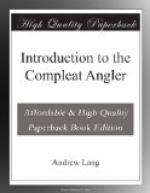’It may be noted that in this age there are a sort of people so unlike the God of mercy, so void of the bowels of pity, that they love only themselves and their children; love them so as not to be concerned whether the rest of mankind waste their days in sorrow or shame; people that are cursed with riches, and a mistake that nothing but riches can make them and theirs happy.’
Thus Walton appears, this is ‘the picture of his own disposition,’ in the Lives. He is a kind of antithesis to John Knox. Men like Walton are not to be approached for new ‘ideas.’ They will never make a new world at a blow: they will never enable us to understand, but they can teach us to endure, and even to enjoy, the world. Their example is alluring:—
’Even the ashes of the just
Smell sweet, and blossom in the
dust.’
THE COMPLEAT ANGLER
Franck, as we saw, called Walton ‘a plagiary.’ He was a plagiary in the same sense as Virgil and Lord Tennyson and Robert Burns, and, indeed, Homer, and all poets. The Compleat Angler, the father of so many books, is the child of a few. Walton not only adopts the opinions and advice of the authors whom he cites, but also follows the manner, to a certain extent, of authors whom he does not quote. His very exordium, his key-note, echoes (as Sir Harris Nicolas observes) the opening of A Treatise of the Nature of God (London, 1599). The Treatise starts with a conversation between a gentleman and a scholar: it commences:—
Gent. Well overtaken, sir!
Scholar. You are welcome, gentleman.
A more important source is The Treatyse of Fysshynge wyth an Angle, commonly attributed to Dame Juliana Barnes (printed at Westminster, 1496). A manuscript, probably of 1430-1450, has been published by Mr. Satchell (London, 1883). This book may be a translation of an unknown French original. It opens:—
’Soloman in hys paraboles seith that a glad spirit maket a flowryng age. That ys to sey, a feyre age and a longe’ (like Walton’s own), ’and sith hyt ys so I aske this question, wyche bynne the menys and cause to reduce a man to a mery spryte.’ The angler ’schall have hys holsom walke and mery at hys owne ease, and also many a sweyt eayr of divers erbis and flowres that schall make hym ryght hongre and well disposed in hys body. He schall heyr the melodies melodious of the ermony




